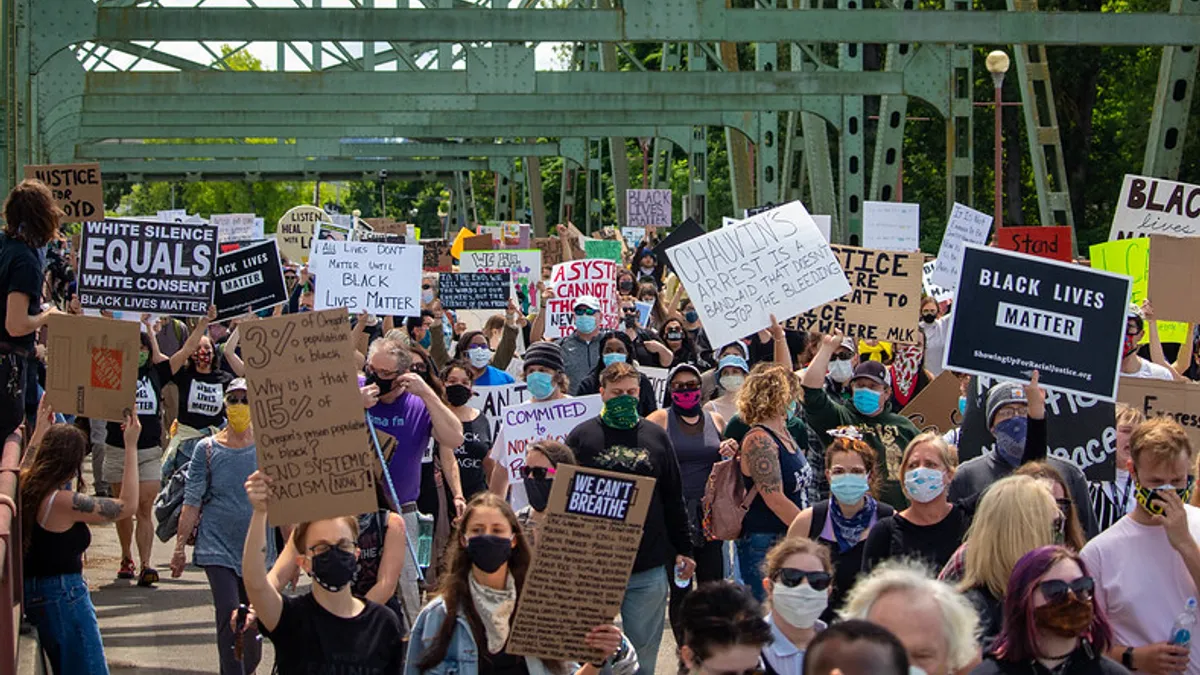On Monday, the National Association of City Transportation Officials (NACTO) declared a clear response to the recent breakout of racial justice demonstrations seen nationally: "The harassment and injustice that people of color, particularly Black people, experience at the hands of law enforcement on transit and in streets and public spaces is unacceptable and wrong."
The message was part of a 600-word statement from the New York-based transportation association, all centered on the theme of solidarity with the Black community. On May 25, a Black man named George Floyd was killed amid an arrest by a Minneapolis Police Department officer, resulting in large protests from Los Angeles to Washington, DC — despite the still-apparent threat of COVID-19.
NACTO, an association of 84 North American cities and transit agencies, is one of many city groups or governments that has spoken out this week against societal injustice. On Saturday, the U.S. Conference of Mayors (USCM) released a statement noting, "Every American and every level of government has a role to play in ending this painful cycle and ensuring there is equal justice for all," while the City of Columbus, OH on Monday declared racism a public health issue.
NACTO declined to elaborate further on its statement to Smart Cities Dive, but the protests have greatly impacted a number of its members’ operations. Stephen Miller, communications lead at app Transit, said most major metropolitan areas are seeing "transit service at the very least redirected around the marches."
In a bid to help riders, Miller said Transit has worked to send immediate notifications to riders in markets where protests have impacted transit schedules. "We know that public transit, particularly during the pandemic, is critical for essential workers who are disproportionately people of color," he told Smart Cities Dive. "We want to make sure they get the information they need as quickly and reliably as possible."
Such markets that saw modified transit schedules include Minneapolis (Metro Transit), Philadelphia (SEPTA), Denver (RTD), Los Angeles (LA Metro) and New York (MTA). Some agencies, including LA Metro and Miami-Dade Transit, have faced criticism for full suspensions of transit or bus operations, which left many essential workers stranded.
In New York, members of the Transport Workers Union (TWU) Local 100 chapter refused to assist the New York Police Department in detaining and transporting protesters on city buses. TWU shared a statement saying its union has "always been at the forefront of the battle against racial and social oppression, breaking the color barriers in every industry where we organize."
George Floyd’s murder was a criminal act and every police officer involved in his killing should be prosecuted. This moment demands that we hear the pleas of those peacefully protesting and take collective action so it never happens again. #JusticeForGeorgeFloyd pic.twitter.com/ddChQKgs84
— TWU (@transportworker) June 1, 2020
Similar decisions to protect protesters were made by the Amalgamated Transit Union (ATU) that represents Minneapolis. Meanwhile, Cincinnati Metro buses were used to transport protesters arrested at demonstrations, a move that was also reportedly seen in a number of other cities including Dallas.
In an analysis of the current role transit plays in the demonstrations, CityLab's Linda Poon explained that transportation access has long collided with trends of racial inequality. NACTO's statement called on transit workers industry wide "to do the work, internally and externally, to truly be drivers of progress towards the values and goals we espouse."
NACTO pointed to funding, projects and hiring as areas where transit agencies can take an "anti-racist approach" to decision-making — something that has been encouraged by Black people and White allies for years. Keith Benjamin, director of the Charleston, SC Department of Traffic and Transportation, said it is important to for agencies and city leaders to take a step back and listen to these voices who have long done the work to promote equitable placemaking.
"It is important that we amplify, fund and implement the work of people and organizations that have already spoken loudly on the intersection of place and race," he said in a tweet.
{A THREAD} One of the dangers of this moment for white counterparts in placemaking is to be invigorated to “do something” instead of just picking up the best practices, voices and research of women/black ppl/white allies from the last 5+ years and put that work to work.
— Keith Benjamin (@rkbtwo) June 2, 2020












